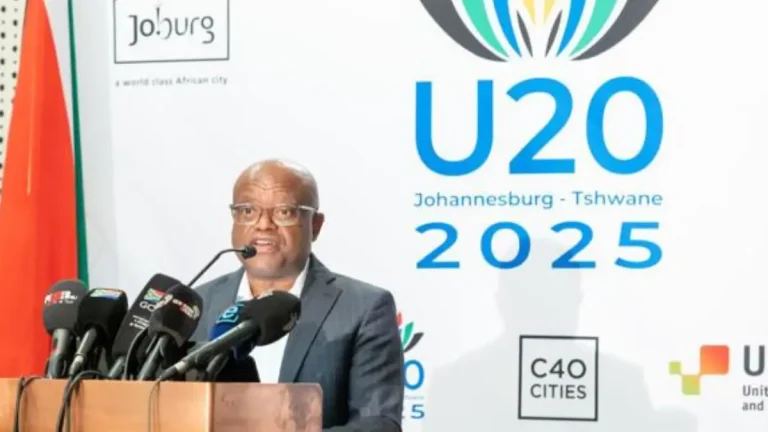Johannesburg Mayor Dada Morero urged the G20 world leaders to see cities as more than implementers of national policy, calling for direct funding and stronger powers in shaping global decisions. Closing the Urban 20 (U20) Summit in Sandton, Morero stressed that cities like Johannesburg sit at the cutting edge of global challenges — from climate change to poverty — and must be equipped to drive solutions.
Thank you for reading this post, don't forget to subscribe!ALSO READ: G20 2025: J20 Summit 2025 Advancing Global Policy Reform and Collaboration
A Clear Message to the G20
The U20 Communiqué, unanimously adopted by city leaders worldwide, delivers a sharp message to the G20: cities need sustainable financing, stronger partnerships, and greater authority in policymaking.
“The U20 Communiqué is not a declaration. It is a call to action — a call for the G20 to recognise the pivotal role that cities have,” Morero said.
The resolution set out three priorities:
- Unlocking accessible, needs-based financing for cities
- Strengthening cooperation across all levels of government
- Prioritising vulnerable communities with inclusive housing, climate action, and green jobs
Morero reminded leaders that finance underpins delivery. He pushed for a “just transition” finance model to channel investment into local infrastructure, affordable housing, clean energy, and stable public services.
G20 Summit: A Summit on African Soil
For the first time, the U20 took place on African soil. South Africa and Gauteng used the opportunity to put African cities firmly on the global agenda.
“With the U20 hosted in Africa for the first time ever, we have a once-in-a-generation opportunity to prove that cities are not junior partners but principals of world politics,” Morero said.
He added that Johannesburg carries a dual burden: hosting a successful summit while showing real progress on the ground before the G20 Leaders’ Summit in November.
Tshwane Joins the Fray
Tshwane Mayor Dr Nasiphi Moya, who co-chaired the summit, amplified Morero’s call. “Our task is to ensure that the voice of Africa is sharpened and heard clearly when we present our joint contribution to the G20 in November,” Moya said.
She highlighted R86 billion in investment pledges secured at Tshwane’s investment summit as evidence that cities can mobilize resources when they take bold initiative.
“Our approach reflects our belief that cities must take responsibility for raising capital to drive infrastructure growth,” she explained. “We are committed to building the infrastructure our people need to live with dignity, travel safely, and grow our local economies.”
Moya criticized the common gap between vision and resources. “Too often, municipalities have the will but not the money. We cannot allow this to limit us anymore. That is why we are bringing investors directly to the table,” she said.
Johannesburg’s Challenges in the Spotlight
While Morero championed cities on the global stage, Johannesburg’s local struggles remain glaring. The city still battles broken infrastructure and poor service delivery, from potholes and malfunctioning traffic lights to frequent water and power cuts.
Crime and urban decay in parts of the inner city have also raised doubts about Johannesburg’s readiness to host the G20 Summit in November.
In response, Morero announced a “Bomb Squad” task team tasked with fast-tracking repairs and unblocking service delivery failures. “What we do for G20 must last longer than the summit,” he said. “This is about making real, lasting improvements for our residents.”
Projects already underway include road resurfacing, water upgrades, and restoring streetlights and traffic signals along major routes. But many residents question whether these upgrades will reach neglected communities or remain limited to areas visible to global delegates.
Why the U20 Matters in Light Of The G20 Summit
The U20 Summit exists to bring the voices of mayors and cities into G20 discussions. For Morero and Moya, this means ensuring African cities aren’t sidelined.
“Let us use this moment to remind ourselves that cities are not only the site of global challenges but the source of global solutions,” Morero said.
Moya added: “We cannot afford to waste this moment. We are determined to use this platform to ensure that Africa is not spoken about but spoken with.”
A Gauteng Watershed
For Gauteng, the summit goes beyond diplomacy. It represents a chance to attract the investments needed to transform crumbling urban infrastructure and build cities that work for their residents.
Energy security, affordable housing, climate resilience, and inclusive growth all depend on municipalities having the resources to act. Without it, Gauteng risks falling further behind its global peers, leaving millions trapped in cycles of poor service and inequality.
From Words to Action
The U20 Summit has ended, but its message to the G20 is clear: empower cities, fund local solutions, and put communities at the center of development.
The task is simple but urgent: hold leaders accountable, support community projects, demand transparency, and push for investments that uplift every corner of the province. Urban development cannot remain a promise on paper — it must become a reality in safer, more liveable cities for all.




